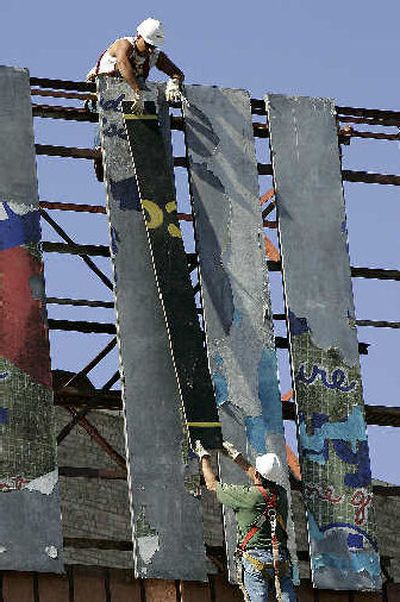FEMA notes show lack of preparedness

WASHINGTON – FEMA struggled to locate food, ice, water and even body bags in the days following Hurricane Katrina, a frantic effort punctuated by bureaucratic chaos, infighting and concerns about media coverage, according to memos obtained Monday by the Associated Press.
“Biggest issue: resources are far exceeded by requirements,” wrote William Carwile, the top Federal Emergency Management Agency official in Mississippi in a Sept. 3 e-mail to a state official. “Getting less than 25 percent of what we have been requesting from HQ daily.”
The memos underscore how FEMA was overwhelmed and underprepared for Katrina. The e-mails – 25 pages in all – represent a partial response to a request for documents by a House panel investigating the government’s slow response to the storm.
Homeland Security Secretary Michael Chertoff is to appear in front of the House panel at a Wednesday hearing. FEMA is an arm of the Homeland Security Department.
Five days after the storm hit on Aug. 29, Michael Brown, then FEMA director, e-mailed an aide saying there had been “no action from us” to evacuate storm victims using planes that airlines had made available.
“This is flat wrong. We have been flying planes all afternoon and evening,” FEMA deputy operations director Michael Lowder e-mailed in reply less than 30 minutes later.
A day earlier, a FEMA official in Mississippi received an e-mail asking for Brown’s satellite phone number so a senior Pentagon official on the Gulf Coast could call him. “Not here in MS (Mississippi). Is in LA (Louisiana) as far as I know,” Carwile e-mailed back, seemingly uncertain on the whereabouts of the government’s point man for responding to the disaster. Carwile recently retired from FEMA.
Battling their own difficulties, FEMA officials were less than complimentary of Louisiana officials.
“This one really has me worried,” Brown confided in an Aug. 27 e-mail, as the storm bore down on the Gulf Coast. “I wish a certain governor was from Louisiana … and his emergency manager,” Brown e-mailed Craig Fugate, emergency manager in Florida, where Jeb Bush is governor.
A few hours later, Patrick Rhode, FEMA’s acting deputy director, e-mailed Brown, “I’m hoping they get serious about evacuating New Orleans.”
Responding, FEMA spokeswoman Natalie Rule said the agency had supplies positioned throughout the Southeast before the storm hit.
“No single e-mail is going to give a clear or accurate picture of the largest federal response mobilization in history,” Rule said.
In an interview Monday, Brown said the memos “in general, will show that this was a disaster of catastrophic proportions where communications were difficult at best, and communications were nonexistent at other times.”
“It shows at a minimum, for a disaster like that, you don’t always have the best information,” said Brown, who announced his resignation under fire Sept. 12 and left the agency last week.
The e-mails also show how Brown and his top deputies worried about the media’s portrayal of the federal response.
“I know that the media will be out in full force, on the ground, in boats, and in the air, but so will we,” Lowder wrote Brown shortly before midnight on Aug. 29.
Two days later, Rhode gave his boss a boost after a news conference with reporters.
“You did a hell of a job on the press conf (sic) this evening!” Rhode wrote in the Sept. 1 e-mail to Brown.